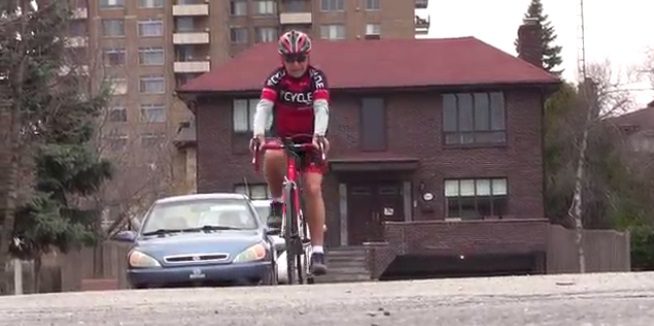Holocaust survivor to retrace liberation by bike


Marcel Zielinski, a lifelong cyclist, has made a life out of defying death.
When the retired Montreal engineer was 10 years old, he remembers men silhouetted against the hard January sun, dressed in white camouflage sheets, entering the camp that held him captive. It was January 1945, and the men were Soviet soldiers—participants in the Allied liberation force. Within hours, the horror experienced by Zielinski and scores of other prisoners of Auschwitz was over.
“All of a sudden,” he wrote, as quoted by the Montreal Gazette, “we were free.”
Suddenly liberated, the experience found Zielinski on the road home. With a group of other children, he set himself on the path back to Krakow, Poland, the place of his birth some 90 miles away. Recently liberated from the most execrably reputed death camp in living memory, though, Zielinski had little more than the clothes on his back—as most of his companions did, too. Yet freedom presented something of a living imperative. “I had barely anything on my back,” Zielinski recalled. “It was cold, I was hungry, we were trying to get shelter.”
The quest for shelter became a quest for home, and it wasn’t without its traumas. Before being reunited with his family, Zielinski was put in an orphanage, the stripe-marked patch on his back identifying him as an Auschwitz survivor. “Some people treated us well; others didn’t,” he said. “Some would give us place in the barn to sleep with animals, which was fine. It was warm. They gave us food—a piece of bread and warm soup.” Even upon returning home, though, the young Zielinski wasn’t reunited with his parents. Nazi forces, seeing the approach of Soviet troops, compelled prisoners into marching—an experience many would not survive. Zielinski believes his father was one of the victims; his mother, who had tried for years to locate him, was never found.
Now 80 years old, Zielinski’s journey hasn’t truly ended.
Next month, Zielinski will be the only Holocaust survivor to participate in the 2015 Ride for the Living, a fundraising ride organized by the Krakow Jewish Community Centre to support the Jewish community of Krakow. Among the 80 cyclists already registered, Zielinski joins 20 other riders from Krakow, while the rest are from the United Kingdom, the United States, and other locales. It’s a trip that retraces his path to liberation, and it will be Zielinski’s first time back to Auschwitz after visiting it seven years ago, a trip that required him to muster quite a bit of courage, he said. “I wanted to go and do it with my son and my wife,” he said, speaking to the Montreal Gazette, “to clear my mind that I was able to go back.”
Zielinski is a lifelong cyclist, having already clocked more than a few kilometres by the 1950s. Cycling competitively in the 1950s after his return to Poland, he gave it up, he said, in order to continue his academic studies and become an electrical engineer. After relocating to Montreal in 1967, Zielinski took it up again—going so far as to embark on a two-month group ride across Canada. “It was the best thing I had ever done for myself,” he said.
Humbly, he said he limits his rides these days to 100 km—a benchmark that should have him well prepared for next month’s ride. “I am looking forward to it,” Zielinski said. “On the other hand, I know it will be very emotional.”
